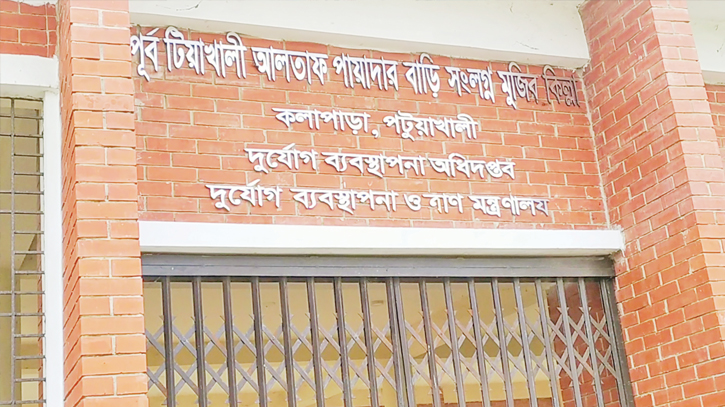
Thirty-three Mujib Kellas, constructed with a budget of Tk 61 crore 45 lakh 41 thousand from the Disaster Management and Relief Directorate, are on the brink of collapse due to structural issues and negligence. Photo: Messenger
The Mujib Kella, also known as Mujib Fort, a government initiative aimed at protecting coastal residents from natural disasters, has become a cause for concern in Patuakhali. Intended to safeguard people and livestock from cyclones and floods, these shelters are now facing severe structural issues, posing a threat to the very lives they were meant to save.
An investigation by the Daily Messenger has revealed that 33 Mujib Kellas, constructed with a budget of Tk 61 crore 45 lakh 41 thousand from the Disaster Management and Relief Directorate, are on the brink of collapse. Two-thirds of the deep tube wells installed in these shelters are non-functional, and the infrastructure is riddled with cracks due to poor construction and corruption.
The shelters, located in isolated areas, were built with sand instead of clay, leading to structural instability. Attempts to conceal the cracks with cement coating have failed, as the balance of the buildings has been compromised. The stairs and aprons of the shelters are separating from the main structures, posing a significant risk to those who seek refuge in them.
PIO Officer Md. Humayun Kabir, when confronted with the state of the shelters, claimed ignorance of the damaged buildings and stated that action would be taken if the damage were confirmed. However, the local residents have expressed their anger and frustration, dismantling parts of the infrastructure with their hands to show the poor quality of the construction.
The Mujib Kella adjacent to Altaf Paydar's house in East Tiakhali of Kalapara Upazila, constructed by M/s Rafique Construction, is a prime example of the shoddy workmanship. The residents fear that these shelters, built as a refuge, could collapse before they can be used, due to corruption and irregularities.
Engineer Zakir Hasan has admitted that the cracks in the shelters are due to the use of new soil but has demanded that the construction of Mujib Kella, marred by irregularities and corruption, should not be abandoned. He suggested demolishing and rebuilding the defective structures.
The LGED and Public Works Department have been informed about the construction issues, with engineers citing non-compaction of soil, irregularities in RCC construction, incorrect column lengths, and insufficient use of cement and water as reasons for the structural failures.
In Rangabali upazila, the Mujib Kellas in Kaukhali and Kodalia villages, constructed by Janakya Shaon Pada, are also facing severe issues. The use of low-quality materials and improper construction techniques have led to the collapse of blocks and the separation of columns from the soil. The completed Kodalia Mujib Kella has a significant crack from the soil level to the floor, and the responsible engineer, Kawsar Ahmed, has not responded to concerns about the construction quality.
The Dasbari Mujib Kella in Rangabali Upazila, built by Hyder Khan, and the Gangipara Mujib Kella have similar problems, with blocks collapsing under minimal stress and improper drainage systems.
Engineer Kawsar Ahmed has acknowledged the lack of proper design and estimation in the project, stating that defective work will be redone. However, the extent of the damage and the potential risk to lives have raised serious questions about the oversight and accountability in the construction of these shelters.
Messenger/Fameema








